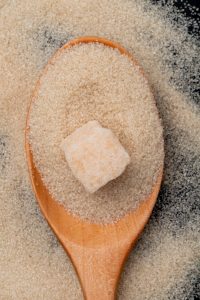Demystifying Artificial Sweeteners: Understand the truth behind this seemingly perfect solution
Published on:August 30 2024
Artificial sweeteners are low-calorie compounds designed to mimic the taste of sugar. Common ones include Saccharin (Sweet n’ Low®), Aspartame (Equal®), and Sucralose (Splenda®). While they may not spike blood sugar levels like sugar, they can cause gastrointestinal issues, such as bloating and diarrhoea, and some, like erythritol, are linked to higher risks of heart attack and stroke.
Artificial sweeteners often present themselves as a tempting alternative to sugar: all the sweetness without the calories. Imagine indulging in your favourite treats without worrying about the added calories that come with sugar. This appealing idea has made artificial sweeteners popular among those aiming to cut calories, manage weight, or control blood sugar levels.
However, beneath this seemingly perfect solution lies a host of significant health concerns that might make you reconsider reaching for that sugar substitute. While the allure of fewer calories and the promise of a guilt-free sweet treat are strong, the reality is that artificial sweeteners can pose more risks to your health than you might expect.
The Health Risks of Artificial Sweeteners
Despite being deemed safe by the FDA and other health agencies, ongoing scientific research continues to examine the potential health impacts of these sweeteners.
Sugar’s addictive properties are well-known, as it triggers the release of dopamine, a neurotransmitter associated with pleasure. This can lead to a cycle of cravings and consumption. Artificial sweeteners, despite having no nutritional value, can be up to 700 times sweeter than sugar and can overstimulate the nervous system, creating a similar, if not more intense, cycle of craving and consumption.
Not only that, long-term consumption of artificial sweeteners has also been associated with several health issues. While the early link between artificial sweeteners and cancer has not been definitively proven, other conditions such as obesity, hypertension, metabolic syndrome, type 2 diabetes, and heart disease have been linked to their use.
Aspartame and sucralose are highlighted among many artificial sweeteners due to their widespread use and significant health implications.
Aspartame, found in many diet sodas and sugar-free products, has been connected to obesity, diabetes, early menstruation, mood disorders, mental stress, depression, and potential impacts on autism when consumed during pregnancy. People with phenylketonuria, migraines, seizure disorders, and those who are pregnant are advised to avoid aspartame.
Sucralose (Splenda), derived from sugar, is significantly sweeter and is designed to pass quickly through the system without affecting blood sugar. However, the alteration process involves adding chlorine, which raises concerns about its regular consumption. The addition of chlorine in sucralose’s chemical structure raises concerns because it creates a compound similar to some toxic chemicals, leading to questions about its long-term safety. While sucralose is generally recognised as safe, studies suggest that it may impact gut health, potentially alter insulin sensitivity, and produce harmful compounds when heated. This has led to ongoing debates about its regular consumption and potential health risks.

Image by stockking on Freepik
Healthier Sweetening Options
Natural sugars, found in fruits, offer a healthier alternative because they come with added benefits like fibre, which helps slow sugar absorption. For instance, while fruits like mangoes and pineapples are high in sugars, their fibre content prevents the sharp spikes and crashes associated with processed sugars. However, individuals with diabetes or prediabetes should still consume these in moderation, opting for lower-glycemic fruits like berries and green apples.
For those looking to reduce sugar and artificial sweetener intake, natural sweeteners like blackstrap molasses, maple syrup, coconut sugar, raw honey, and stevia are better options. However, these should also be consumed in moderation.
Reducing Sugar and Artificial Sweetener Intake
The Ministry of Health recommends a maximum sugar allowance of no more than 10% of daily total energy intake (10 teaspoons of sugar). These guidelines may be even stricter for those with insulin resistance, prediabetes, or diabetes.
When cutting down on sugar and artificial sweeteners, start by avoiding packaged foods labelled as “low calorie,” “no calories,” “low sugar,” and “no sugar added,” as these often contain artificial sweeteners. Be mindful of hidden sugars in foods like salad dressings, pasta sauces, cheese, and crackers by checking nutrition labels. With the BUZUD app’s Add Notes function, you can take a picture of your meal, and it will conveniently display the carbohydrate, protein, and fat content, helping you make more informed choices.
As we navigate the complexities of managing blood sugar levels, it’s crucial to consider not only what we consume but also how we monitor our health. BUZUD Continuous Glucose Monitoring Systems (CGMS) offer a reliable and convenient way to keep track of your glucose levels in real-time, providing valuable insights that can help you make informed decisions about your diet and overall wellness. By integrating BUZUD CGMS into your daily routine, you can take proactive steps to manage your health more effectively and avoid the potential risks associated with artificial sweeteners and other dietary choices.
Demystifying Artificial Sweeteners: Understand the truth behind this seemingly perfect solution






